- Home
- Georgette Heyer
The Black Moth Page 31
The Black Moth Read online
Page 31
Richard led Jenny, whom he was to ride home, up to the door of the vehicle, and expostulated.
‘But what in thunder am I to do with the man?’
‘Give him to Warburton,’ advised Jack flippantly. ‘I know he needs a clerk – he always did!’
‘But perhaps he will not desire to come –’
‘You do as I tell you!’ laughed his brother. ‘I shall expect to find him at Wyncham when I arrive! Au revoir!’ He drew his head in, and the coach rumbled off.
Twenty-nine
Lady O’Hara is Triumphant
After spending a restless night, starting at every sound, and hearing the hours strike slowly away, Lady O’Hara arose not a whit refreshed and considerably more ill at ease than she had been before.
During the night she had imagined all sorts of impossible horrors to have befallen her husband, and if, when the reassuring daylight had come, the horrors had somewhat dispersed, enough remained to cause her an anxious morning as she alternated between the hall window and the gate.
No less worried was Jim Salter. He had returned from Fittering last night to find his master and Sir Miles gone, Lady O’Hara in a state of frightened bewilderment, and the house in a whirl. No one, least of all poor Molly, seemed to know exactly where the two men had gone. All she knew was that they had come back upon a scene of turmoil, with Mr Beauleigh in the midst of a small crowd of excited servants. Her husband had elbowed his way through, and into his ears had Mr Beauleigh poured his story. Then O’Hara seemed to catch the excitement, and she had been hurried into the house with the hasty explanation that Jack was off after Devil, who had caught Diana, and he must to the rescue. Ten minutes after, she had an alarming vision of him galloping off down the drive, his sword at his side and pistols in the saddle-holsters. The poor little lady had sent an imploring cry after him, checked almost before it had left her lips. Afterwards she wished it had never been uttered, and rather hoped that it had escaped O’Hara’s ears.
Salter arrived not half-an-hour later, and his feelings when told that his beloved master had ridden off in search of a fight, may be more easily imagined than described. He was all for setting out in his wake, but her ladyship strongly vetoed the plan, declaring that Sir Miles would be rescue enough, and she was not going to be left entirely without protectors. Jim was far too respectful to point out there were five able-bodied men, not counting himself, in the house, but as his master had left no instructions for him, he capitulated.
He proved nought but a Job’s comforter next day, for when my lady pessimistically premised that both Carstares and her husband were undoubtedly hurt, he did not, as she expected he would, strive to reassure her, but gave a gloomy assent. Whereupon she cast an indignant glance in his direction, and turned her back.
At four in the afternoon they were both in the hall, anxiously watching the drive.
‘To be sure, ’tis monstrous late!’ remarked Molly, with wide, apprehensive eyes.
‘Yes, my lady.’
‘If – if nought were amiss, they should have been back by now, surely?’
‘Yes indeed, my lady.’
Lady O’Hara stamped her foot.
‘Don’t say yes!’ she cried.
Jim was startled.
‘I beg pardon, m’lady?’
‘You are not to say yes! After all, they may have gone a long way – they – er – they may be tired! Jenny may have gone lame – anything – anything may have happened!’
‘Yes, m’ – I mean certainly, your ladyship!’ hastily amended Jim.
‘In fact I should not be surprised an they were not at all hurt!’
He shook his head despondently, but luckily for him the lady failed to notice it, and continued with airy cheerfulness:
‘For my husband has often told me what an excellent swordsman Mr Carstares is, and –’
‘Your ladyship forgets his wound.’
What she might have been constrained to reply to this is not known, for at that moment came the sound of coach-wheels on the gravel. With one accord she and Salter flew to the door, and between them, wrenched it open, just as a gentleman’s travelling coach, postillioned by men in gold and black, and emblazoned with the Wyncham arms, drew up at the door.
My lady was down the steps in the twinkling of an eye, almost before one of the grooms had opened the door to offer an arm to my lord. Carstares sprang lightly out followed by O’Hara, seemingly none the worse for wear.
Molly ran straight into her husband’s arms, regardless of the servants, hugging him.
Jim Salter hurried up to my lord.
‘Ye are not hurt, sir?’ he cried.
Carstares handed him his hat and cloak.
‘Nought to speak of, Jim. But “Everard” well-nigh finished me for all that!’ He laughed at Jim’s face of horror, and turned to Molly, who, having satisfied herself that her husband was quite uninjured and had never once been in danger of his life, had come towards him, full of solicitude for his shoulder.
‘Oh, my dear Jack! Miles tells me you have hurt your poor shoulder again! And pray what has been done for it? I dare swear not one of you great men had the wit to summon a doctor, as indeed you should have, for –’
‘Whist now, asthore!’ adjured her husband. ‘’Tis but a clean scratch after all. Take him into the house and give him something to drink! I’ll swear ’tis what he needs most!’
Molly pouted, laughed and complied.
Over the ale Jack related the whole escapade up to the moment when he had parted from Diana at Littledean. Then O’Hara took up the tale with a delightful chuckle.
‘Sure, Molly, ye never saw anything to equal poor old Beauleigh when his daughter told him Jack’s name! Faith, he didn’t know what to do at all, he was so excited! And Miss Betty I thought would have the vapours from the way she flew from Di to Jack and back again, in such a state of mind as ye can’t imagine!’
Molly, who had listened with round eyes, drew a deep ecstatic breath. Then she bounced up, clapping her hands, and proclaiming that she was right after all!
‘What will ye be meaning, alanna?’ inquired O’Hara.
‘Pray, sir, did I not say over and over again that if I could induce Jack to stay with us everything would come right? Now, Miles, you know I did!’
‘I remember ye said something like it once,’ admitted her spouse.
‘Once, indeed! I was always sure of it. And I did coax you to stay, did I not, Jack?’ she appealed.
‘You did,’ he agreed. ‘You assured me that if I was churlish enough to leave, Miles would slowly sicken and pine away!’
She ignored her husband’s ribald appreciation of this.
‘Then you see that ’tis all owing to me that –’ She broke off to shake O’Hara, and the meeting ended in riotous hilarity.
When he went to change his clothes, Carstares found Jim already in his room awaiting him. He hailed him gaily, and sat down before his dressing-table.
‘I require a very festive costume to-night, Jim. Rose velvet and cream brocade, I think.’
‘Very good, your lordship,’ was the prim reply.
Jack slewed round.
‘What’s that?’
‘I understand your lordship is an Earl,’ said poor Jim.
‘Now who was the tactless idiot who told you that? I had intended to break the news myself. I suppose now, you know my – story?’
‘Yes, si – my lord. I – I suppose ye won’t be requiring my services any longer?’
‘In heaven’s name, why not? Do you wish to leave me?’
‘Wish to – ! No, sir – my lord – I – I thought ye’d maybe want a smarter valet – and – not me.’
My lord turned back to the mirror and withdrew the pin from his cravat.
‘Don’t be a fool.’
This cryptic remark seemed
greatly to reassure Jim.
‘Ye mean it, sir?’
‘Of course I do. I should be lost without you after all this time. Marry that nice girl at Fittering and she shall maid my lady. For I’m to be married as soon as may be!’
‘Ay, si – my lord! I’m sure I’m very glad, s – your lordship. Rose, sir? With the silver lacing?’
‘I think so, Jim. And a cream – very pale cream waistcoat, broidered in with rose. There is one, I know.’
‘Yes, sir – your lordship.’
My lord eyed him despondently.
‘Er – Jim!’
‘Yes – your lordship?’
‘I’m sorry, but I cannot endure it.’
‘I beg pardon, my lord?’
‘I can’t have you call me “your lordship”, after every second word – I really cannot.’
‘Why, sir – may I still call you “sir”?’
‘I would much rather you did.’
‘Ah, sir, thank you.’…
In the middle of tying the bow to his master’s wig, Jim paused, and in the mirror Jack saw his face fall.
‘What’s amiss now? And what have you done with my patches?’
‘In that little box, sir – yes – that one. I was just thinking – here’s the haresfoot, sir – that I shall never be able to see ye hold up a coach now!’
My lord, striving to affix the patch in just the right spot at the corner of his mouth, tried to control his features, failed, and went off into a peal of laughter that reached O’Hara in the room across the landing, and caused him to grin delightedly. He had not heard that laugh for many a long day.
Epilogue
His Grace of Andover sat at the window of his lodgings at Venice, looking down at a letter in his hand. The writing was his sister’s. After a moment he drew a deep breath and broke the seal, spreading the sheets out upon the broad sill.
My very dear Tracy,
So you have gone again with no Farewell to yr. poor Sister, sir! I am indeed very offended, but I understand yr. Reason. As soon as I set mine eyes on Diana I knew the Truth and recognised yr. dark Beauty. I am monstrous grieved for you, dear. I quite love her myself, altho’ she is very tiresomely lovely, but perhaps as she is dark and I am fair, we shall not clash.
The Home-coming was prodigious exciting. Andrew was present, Dicky, of course, and me. Mrs Fanshawe, too, was there, for she knew Jack Abroad, and a monstrous queer Old Man, who was vastly fidgety and overcome to see Jack. Then Sir Miles and his wife came, who I thought quite agreeable nice People, and Diana’s Father and Aunt, rather Bourgeois, but, on the whole, presentable.
Everyone knows the truth now, but most People have been prodigious kind and I scarce notice a difference in our Reception. Dearest Dicky is gayer than he was wont to be and more darling, and I almost enjoy being a Social Outcast.
When Diana is properly gowned, as should suit her position (but I grieve to say that she prefers to dress plainly), she will make a prodigious Elegant Countess. I have promised to conduct her to my own Mantua Maker, which is very sacrificing, as I am sure You will agree. I know London will go Crazy about her, and, indeed, those who have already seen her, which is Avon and Falmouth, are positively Foolish. I make no doubt ’twill be very mortifying, but I suppose it must be borne.
She and Jack are prodigious happy together; it is most Unfashionable, but so am I happy with Dick, so there are a Pair of us, and we had best set Fashion.
Pray, return soon, my dear Tracy, you cannot conceive how I miss you. I was surprised you went away with Mr Fortescue, I had no Notion you were so friendly.
With dearest Love,
Yr. Sister,
Lavinia
P.S. – Twill interest you to hear that Miss Gunning is to marry Coventry. ’Tis all over Town this last Week.
Slowly his Grace put the sheets together and handed them to Fortescue, who had come into the room.
‘These, from my sister, may possibly interest you, Frank.’
Fortescue read the letter through, and at the end folded it and handed it back in silence. Tracy laid it down on the table at his elbow.
‘I began – wrongly,’ he said.
‘Yes,’ assented his friend. ‘She was not – that kind of girl.’
‘But having begun wrongly – I could not undo the wrong.’
‘So you made it worse,’ said Fortescue gently.
‘I would have married her in all honour –’
‘In your own arrogant fashion, Tracy.’
‘As you say – in my own arrogant fashion, Frank. If I could go back a year – but where’s the use? I am not whining. Presently I shall return to England and make my bow to – the Countess of Wyncham. Possibly, I shall not feel one jealous qualm. One never knows. At all events – I’ll make that bow.’
‘You will?’ Frank looked sharply down at him.
‘Nothing more, Tracy! You do not purpose –’
‘Nothing more. You see, Frank – I love her.’
‘I crave your pardon. Yes – she would not take you, but she has, I think, made you. As I once told you, when love came you would count yourself as nought, and her happiness as everything.’
For a moment his Grace was silent, and then back came the old smile, still cynical, yet with less of the sneer in it.
‘How very pleasant it must be, Frank, to have one’s prophecies so happily verified!’ he purred. ‘Allow me to felicitate you!’
About the Author
Author of over fifty books, Georgette Heyer is one of the best-known and best-loved of all historical novelists, making the Regency period her own. Her first novel, The Black Moth, published in 1921, was written at the age of fifteen to amuse her convalescent brother; her last was My Lord John. Although most famous for her historical novels, she also wrote twelve detective stories. Georgette Heyer died in 1974 at the age of seventy-one.

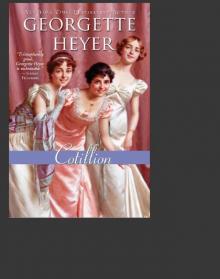 Cotillion
Cotillion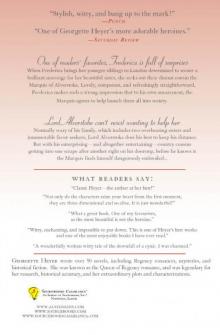 Frederica
Frederica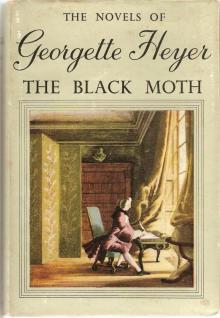 The Black Moth: A Romance of the XVIIIth Century
The Black Moth: A Romance of the XVIIIth Century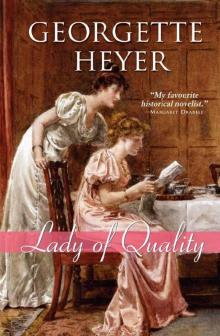 Lady of Quality
Lady of Quality Snowdrift and Other Stories
Snowdrift and Other Stories An Infamous Army
An Infamous Army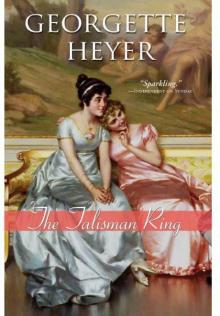 The Talisman Ring
The Talisman Ring Venetia
Venetia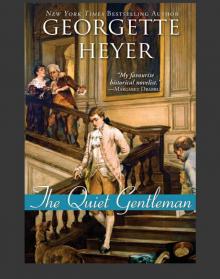 The Quiet Gentleman
The Quiet Gentleman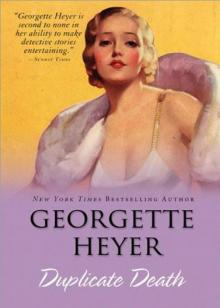 Duplicate Death
Duplicate Death Cousin Kate
Cousin Kate Black Sheep
Black Sheep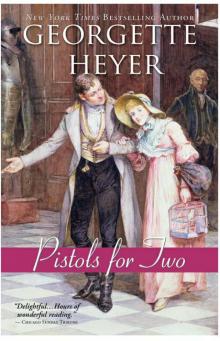 Pistols for Two
Pistols for Two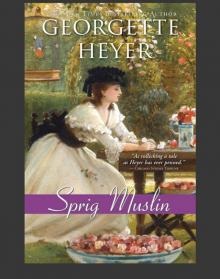 Sprig Muslin
Sprig Muslin No Wind of Blame
No Wind of Blame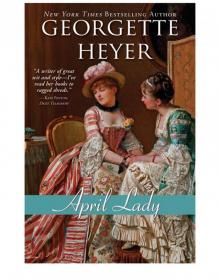 April Lady
April Lady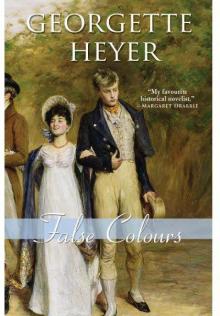 False Colours
False Colours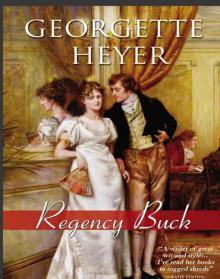 Regency Buck
Regency Buck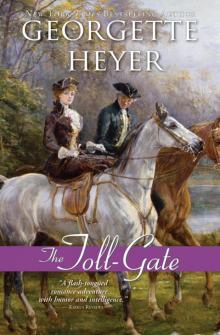 The Toll-Gate
The Toll-Gate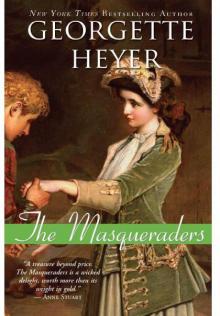 The Masqueraders
The Masqueraders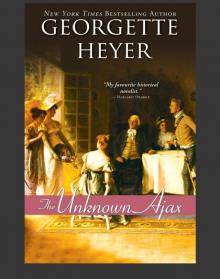 The Unknown Ajax
The Unknown Ajax The Grand Sophy
The Grand Sophy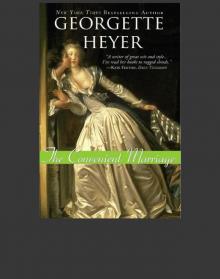 The Convenient Marriage
The Convenient Marriage Faro's Daughter
Faro's Daughter The Conqueror
The Conqueror The Foundling
The Foundling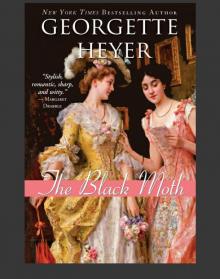 The Black Moth
The Black Moth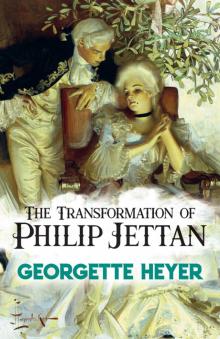 The Transformation of Philip Jettan
The Transformation of Philip Jettan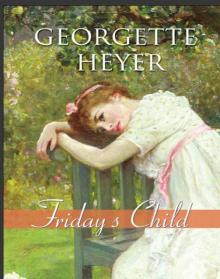 Friday's Child
Friday's Child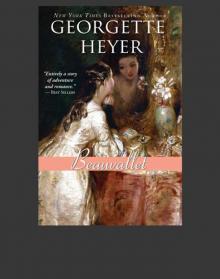 Beauvallet
Beauvallet They Found Him Dead
They Found Him Dead Charity Girl
Charity Girl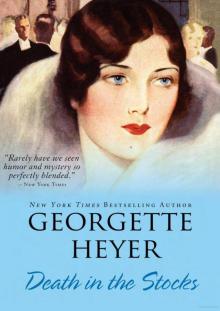 Death in the Stocks: Merely Murder
Death in the Stocks: Merely Murder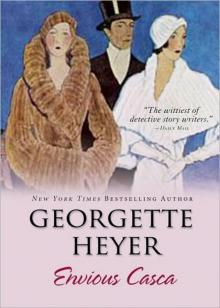 Envious Casca
Envious Casca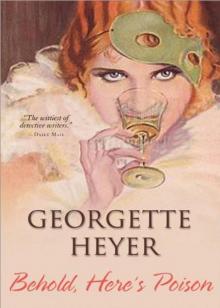 Behold, Here's Poison
Behold, Here's Poison Arabella
Arabella The Nonesuch
The Nonesuch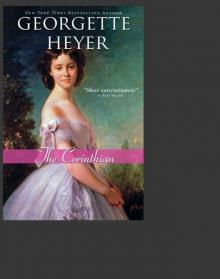 The Corinthian
The Corinthian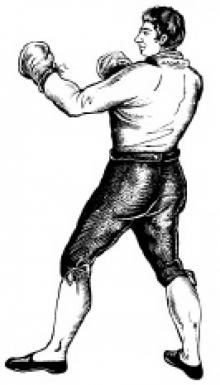 Jennifer Kloester
Jennifer Kloester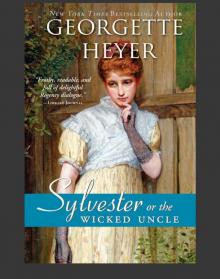 Sylvester
Sylvester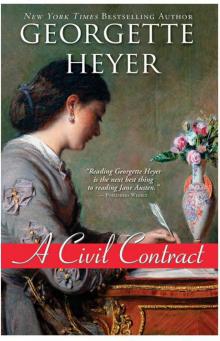 A Civil Contract
A Civil Contract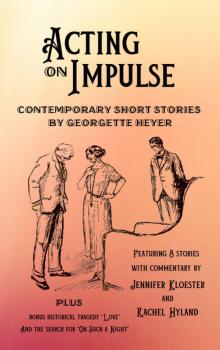 Acting on Impulse
Acting on Impulse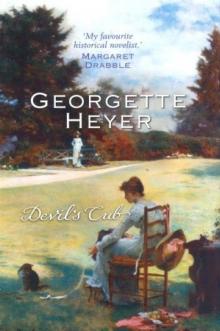 Devil’s Cub at-2
Devil’s Cub at-2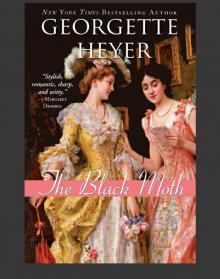 Black Moth
Black Moth Grand Sophy
Grand Sophy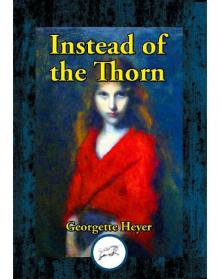 Instead of the Thorn
Instead of the Thorn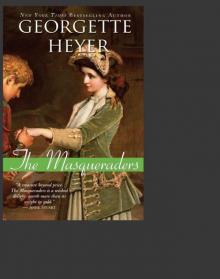 Masqueraders
Masqueraders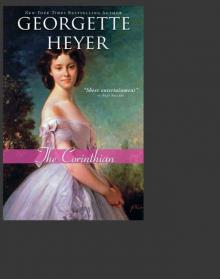 Corinthian
Corinthian Reluctant Widow
Reluctant Widow